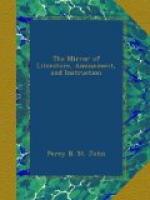The Spanish revolution, which originated in the Isla de Leon, inspired the South Americans with new hopes. These were raised still higher by the solicitude of Morillo to negotiate an armistice; but Bolivar, refusing to treat upon any other basis than that of independence, marched to the department of the Magdalena, reviewed the besieging force before Carthagena, and reinforced the division of the south, destined to act against Popayan and Quito. The president drove the Spaniards from the provinces of Merida and Truxillo, and established his winter headquarters at the latter town. On the 26th of November, the president concluded an armistice of six months with Morillo, who engaged that, on the renewal of hostilities, the war should be carried on, conformably to the practice of civilized nations.
In the beginning of the year 1821, the liberator went to Bogota, to attend to the affairs of the south; when hearing of the arrival at Caracas of Spanish commissioners to treat for peace, he returned to Truxillo; but no terms were then agreed upon. In the meanwhile, the province of Maracaybo shook off the Spanish yoke. Morillo having departed for Europe, General La Torre, a brave and very superior man, succeeded to the command of the royal army, and made strong remonstrances against the movement in the province of Maracaybo, which he deemed an infraction of the armistice, and hostilities in consequence recommenced. The liberator concentrated his forces in Varinas; he detached a division to the coast under General Urdaneta, and another to the east, under General Bermudez, to divide the attention of the enemy, and marched himself against Caracas. On the 24th of June, the liberator attacked and defeated the Spaniards, who had taken up a strong position at Carabobo. The numbers on both sides were nearly equal. This battle decided the fate of Colombia. The victorious liberator entered Caracas on the 29th. On the 2nd of July, La Guayra also surrendered to him.
Leaving a besieging division before Puerto Cabello, the liberator went to Cucuta, where he resigned once more the office of president of the republic, which, in admiration of his disinterestedness, instantly re-elected him.
When the province of Guayaquil declared itself independent, it solicited the assistance of Bolivar against the Spaniards in Quito. A small division was accordingly sent there.
The liberator, having signed the constitution sanctioned by congress, obtained leave to direct the war in the south. In January, 1822, he put himself at the head of the army in Popayan, and sent a reinforcement to General Sucre in Guayaquil.




